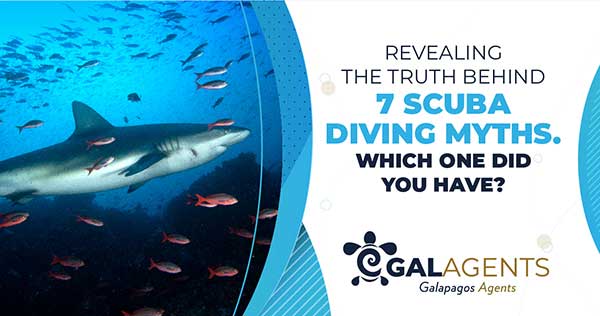Like many sports, many myths surround scuba diving, like the perception that it is an unsafe water sport that requires high investment. It is restricted to young and healthy people that can constantly go to tropical waters to practice it. These and many more myths we will unveil in this article.
1. The deeper, the better the diving experience!

The widespread belief is that diving is worth it only if you explore the deepest sea, ideally for those who love this type of challenge on the darkest, colder, and barely explored sea floor. Yet, that’s not 100% true. Indeed, many scuba divers explore the sea at an average depth of 18m/60ft, where there is better visibility by appreciating the species’ colors and enjoying warmer waters.
2. Are the Tropics the Pinnacle of Diving?

For many, scuba diving is a synonym for crystalline turquoise waters in the warm tropical seas, and undeniably they are. However, there are plenty of suitable places for practicing scuba diving. In fact, divers can do it wherever there is enough water to dive into it, such as lakes, and some diving sites are in the cold waters of Canada, the UK, and South Africa. Moreover, diving in different types of water bodies helps divers to master their skills and endure an array of environments and temperatures.
3. Dogs are more dangerous for people than sharks for divers!

The fear of sharks that the Jaws movies installed in the general conscious mind is very common. Thus, many imagine that these sharks highly threaten divers, and indeed they are. But, believe it or not, as Mr. Ripley used to say, the International Shark Attack File claims that in 2005 only four divers were attacked by a shark in the world. On the other hand, the “human’s best friend” killed 27 people in a year and seriously injured or maimed 4.7 million people worldwide (Scubadiving.com).
Watching a shark is very rear unless taking a specialized tour for diving among sharks. In fact, many divers won’t see a shark in their entire life. Thus, if they are lucky enough to meet a fellow shark in the sea, it’s highly probable that the shark will shy away.
4. Do you need to break the bank to become a diver?

If you see all the equipment scuba divers need, you may think that it is a costly sport and the cost of getting certified. However, PADI mentioned that “the cost to become a certified diver is similar to what you’d spend learning other outdoor activities.” Yet, the investment is for a global lifetime certification, starting with the “Open Water Diver Course,” which is not as expensive as some kayaking lessons.
Most of the gear, for not saying all, is available for rent. Depending on the diving tour, it includes some of the equipment needed, such as in the case of the Galapagos Islands and the equipment they offer onboard liveaboard cruises.
5. Do divers need to be expert swimmers and in good shape?

If you think that to be a good diver, you need to be an experienced swimmer with tons of swimming hours; you’re a bit far from reality. Swimming is vital for this water sport, but aside from what many think about it, according to PADI, divers need basic water skills, like:
- Float or tread water for 10 minutes without any flotation aids, even if in a “dog paddle.”
- Swim 200-300 meters/yards without stopping and wearing masks, fins, and snorkel.
Also, as explained in this video, there are no limits for people with mobility and health conditions because they can help and train with certified instructors, like PADI professionals, to become certified divers.
Regarding health issues, as with many sports, practicing requires some risks, especially for those diagnosed with hypertension, high blood pressure, or diabetes, but it’s not impossible. The recommendation is to check with a doctor about your health condition before beginning certification and get their advice. Don’t worry about your age because some people have been certified at 74 years old, for example.
6. Claustrophobic people cannot be a diver
This is a widespread concern among people, and surprisingly, many claustrophobics have used scuba diving to overcome the fear, such as this case shared by PADI. So, in these cases, the key is to talk about all the feelings and fears about diving so that the professional instructor can clarify all the doubts. Then, there are some initial options, such as practicing in a pool or pool-like environment.
7. Does your safety rely on the diving instructor?

You are the only one responsible for your safety, even though you and your dive leader are meant to aid and watch out for one another. You must be a self-sufficient, knowledgeable, and prudent diver!
Plan your dives, review them with your guide, and be aware of your dive target, timing, emergency procedures, etc. Ask for them before entering the water if you don’t know them.
Your fellow divers, guides, and boat crew will do their best to make all divers secure and comfortable; your security ultimately rests with you.
Many myths surround scuba diving, but all vanished with knowledge and assistance. Thus, let us know your questions and doubts, and our colleague Gonzalo Risueno will help you answer them. And if you want to discover the offer and conditions for diving in the Galapagos Islands, we will be happy to support you to become a Galapagos diver expert.
Would you like more information about diving, don’t miss these readings:
- The answer you need to know about 4 of the Galapagos diving FAQs
- Galapagos Scuba Diving: A business opportunity to increase revenue and income
Sources:
https://blog.padi.com/top-10-scuba-diving-myths/
https://dipndive.com/blogs/stories/7-common-scuba-diving-myths-and-the-truth-behind-them
https://www.scubadiving.com/training/basic-skills/10-myths-about-diving#page-3

